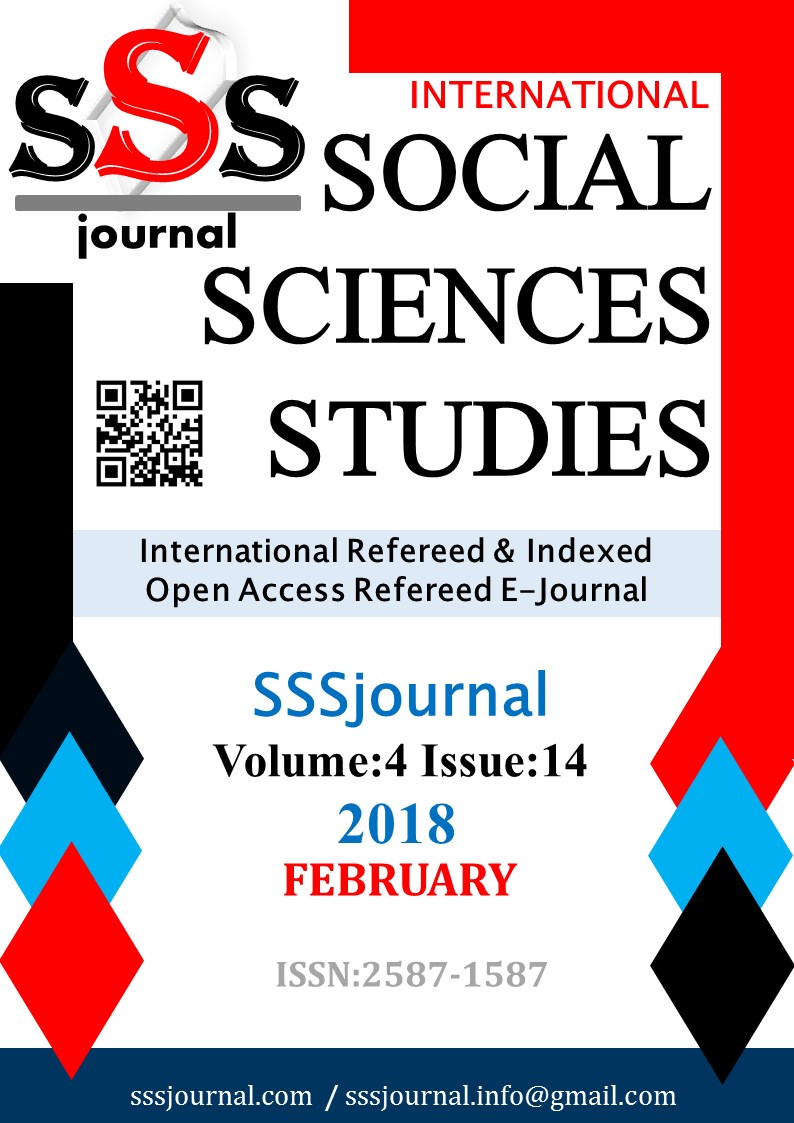Author :
Abstract
Bourdieu sosyolojisi ile diğer sosyologların metodolojilerinin ayrıldığı nokta Bourdieu’nun kabul gören genellemeleri sorgulaması ve bu bağlamda karşıtlıkları birleştirme çabasıdır. Sosyoloji biliminin temelini atan klasik sosyologlar ve onların ortaya attıkları kavramlar günümüze kadar birikerek, sosyoloji bilimine bir temel oluşturmuşlardır. Bu birikim birtakım karşıtlıkları da beraberinde getirmiştir. Bourdieu metodolojisinde bir diğer ayrım bu söz konusu karşıtlıkları aşma çabası ve girişimleridir. Bourdieu‘nun kavramsal gelişimi habitus, sermaye ve alan kavramları kullanmada, meta kuramsal ilkeler ve geniş bir perspektif ile konumlanmaktadır. Bourdieu ilişkisel düşünmek bağlamında, toplumsal bütünleşme fikri ve rasyonelleşme temasını esas olarak, sosyal gerçekliği bütün olarak anlama çabalarında bulunmuştur. Bourdieu her kavram ve kuramın, incelenen olgu ve olaya göre açıklayıcılığının değişebileceği varsayımından yola çıkarak, kavramlar arasındaki ikiliklere eleştirel bakış açısı getirmiştir. Bourdieu’nun bu kavramlara bakış açısında önemli bir ifade yolu reflexive ifadesidir. Reflexive ile Bourdieu, neden ve sonuç arasında iki yönlü dönüşlü dairesel ilişkiler kurmayı amaçlamaktadır. Bu bağlamda sosyal bilimlerde, düşünümsel arka plan üzerinde, kendisini tetikleyen etmenleri dönüşümlü olarak etkisi altına alan bir toplumsal eylem ile anlamlandırma çabası söz konusudur. Bu çalışma ile, bu bakış açıları perspektifinde Bourdieu’nun üzerinde çok düşündüğü alan, habitus ve sermaye kavramları irdelenmeye çalışılmıştır.
Keywords
Abstract
The point at which the methodologies of Bourdieu sociology and other sociologists partake is the question of Bourdieu's accepted generalities and in this context an attempt to combine oppositions. The classical sociologists who laid the foundations of sociological science and the concepts they invented have formed a basis for the science of sociology by accumulating them day by day. This accumulation brought with it certain oppositions. Another distinction in the Bourdieu methodology is the effort and initiatives to overcome opposition. Bourdieu's conceptual development is based on the use of habitus, capital and space concepts, meta-theoretic principles and a broad perspective. In the context of Bourdieu's relational thinking, the idea of social integration and rationalization has mainly been found in the effort to understand the social reality as a whole. Bourdieu has brought a critical view of the dualities between concepts, guided by the assumption that every concept and theory is subject to change in the explanatory nature of the phenomenon examined. An important way of expressing Bourdieu's point of view on these concepts is the reflexive expression. Reflexive and Bourdieu intend to establish two-way circular relations between cause and effect. In this context, in social sciences, there is a struggle to make meaning with a social action that influences the triggering factors alternately on the thoughtful background. With this work, the concept of habitus and capital, which is very much considered by Bourdieu in the perspective of this perspective, has been tried to be examined.
Keywords
- Bourdieu, Pierre (1983). “Ökonomisches Kapital, Kulturelles Kapital, Soziales Kapital”, Hrsg: Kreckel,
- Bourdieu, Pierre (1983). “Ökonomisches Kapital, Kulturelles Kapital, Soziales Kapital”, Hrsg: Kreckel, Reinhard, Soziale Ungleichheit, Soziale Welt, Sonderband 2. Göttingen.
- Bourdieu, Pierre Et Al. (1990). Photography: A Middle-Brow Art, Stanford :Stanford University Press Bourdieu.
- Bourdieu, Pierre (1991). “Sport And Social Class”. Rethinking Popular Culture, (Ed) Chandra Mukerji- Michael Schudson, University Of California Press: London.
- Bourdieu, Pierre (1994). Distinction: A Social Critique Of The Judgement Of Taste. Londra: Routledge And Kegan Paul.
- Bourdieu, Pierre (1995). Pratik Nedenler. Çev. Hülya Tufan. İstanbul: Kesit Yayıncılık.
- Bourdieu, Pierre (1997). Toplumbilim Sorunları. Çev. Işık Ergüden. İstanbul: Kesit Yayıncılık. Bourdieu, Pierre (1999a). Sanatın Kuralları. Çev. Necmettin Kamil Sevil. İstanbul: Yky
- Bourdieu, Pierre (1999b). Outline Of A Theory Of Practice. (Tr.) Richard Nice. Cambridge: Cambridge University Press.
- Bourdieu, Pierre (2000a). Televizyon Üzerine. Çev. Turhan Ilgaz. İstanbul: Yky.
- Bourdieu, Pierre, Volume I. (2000b) Derek Robbins (Ed.) İçinde, S. 87-116. (Theory And Society Vol.14, S. 745-775).
- Bourdıeu, P. (2005). Hukukun Gücü: Yasal Alan›N Sosyolojisine Do¤Ru. Çeviren: Sibel Demir, Ankara: Kalan Yayınları.
- Bourdıeu, P. (2006a). Pratik Nedenler: Eylem Kuramı Üzerine. Çeviren: Hülya Uğur Tanrıöver, İstanbul: Hil Yayınları.
- Bourdıeu, P. (2006b). Sanatın Kuralları: Yazınsal Alanın Oluşumu Ve Yapısı, Çeviren: N. Kamil Sevil, İstanbul: Yapı Kredi Yayınları.
- Bourdıeu, P. (2007). “Viva La Crise!: Sosyal Bilimde Heterodoksi İçin”, İçinde: Güney Çetin, Emrah Göker,Alim Arlı, Ümit Tatlıcan (Der.) Ocak Ve Zanaat: Pierre Bourdieu Derlemesi. İstanbul: İletişim Yayınları.
- Bourdieu, Pierre (2010). “Sermaye Biçimleri”, Derleyenler: M. M. Şahin Ve A. Z. Ünal, Sosyal Sermaye, Değişim, İstanbul.
- Braun, Sebastian. (2002). “Soziales Kapital, Sozialer Zusammenhalt Und Soziale Ungleichheit”, Aus Politik Und Zeitgeschichte.
- Brubaker, Rogers (1985). “Rethinking Classical Theory: The Sociological Vision Of Pierre Bourdieu”. Brubaker, Rogers (1993). “Social Theory As Habitus”.
- Calhoun, C. (2007). “Bourdieu Sosyolojisinin Ana Hatları”, İçinde: Güney Çetin, Emrah Göker, Alim Arlı, Ümit Tatlıcan (Der.) Ocak Ve Zanaat: Pierre Bourdieu Derlemesi. İstanbul: İletişim Yayınları.
- Swartz, David. (1997). Kültür Ve İktidar Pierre Bourdieu’nun Sosyolojisi, İstanbul, İletişim Yayınları. Gorski, Philip S. (2015). Bourdieu Ve Tarihsel Analiz, İstanbul, Heretik Yayıncılık.
- Field, John (2008). Sosyal Sermaye, 2.Baskı, İstanbul Bilgi Üniversitesi Yayınları, İstanbul. Köse, H. (2004). Bourdieu Medyaya Karşı, İstanbul: Papirüs Yayınevi.
- Tatlıcan, Ü, Çeğin, G. (2007). “Bourdieu Ve Giddens: Habitus Veya Yapının İkiliği”, İçinde: Güney Çeğin,Emrah Göker, Alim Arlı, Ümit Tatlıcan (Der.) Ocak Ve Zanaat: Pierre Bourdieu Derlemesi. İstanbul: İletişim Yayınları.
- Timur, Taner (2006). Marksizm, İnsan Ve Toplum Balibar, Seve, Althusser, Bourdieu, İstanbul, Yordam Kitap.
- Wacquant, Loic J. D. (2003). “Düşünümsel Bir Antropoloji İçin Cevaplar’a Giriş”, İçinde Düşünümsel Bir Antropoloji İçin Cevaplar, İstanbul, İletişim Yayınları.
- Wallance, Ruth, Wolf, Allison (2013). Çağdaş Sosyoloji Kuramları, İstanbul, Doğu-Batı Yayınları.
